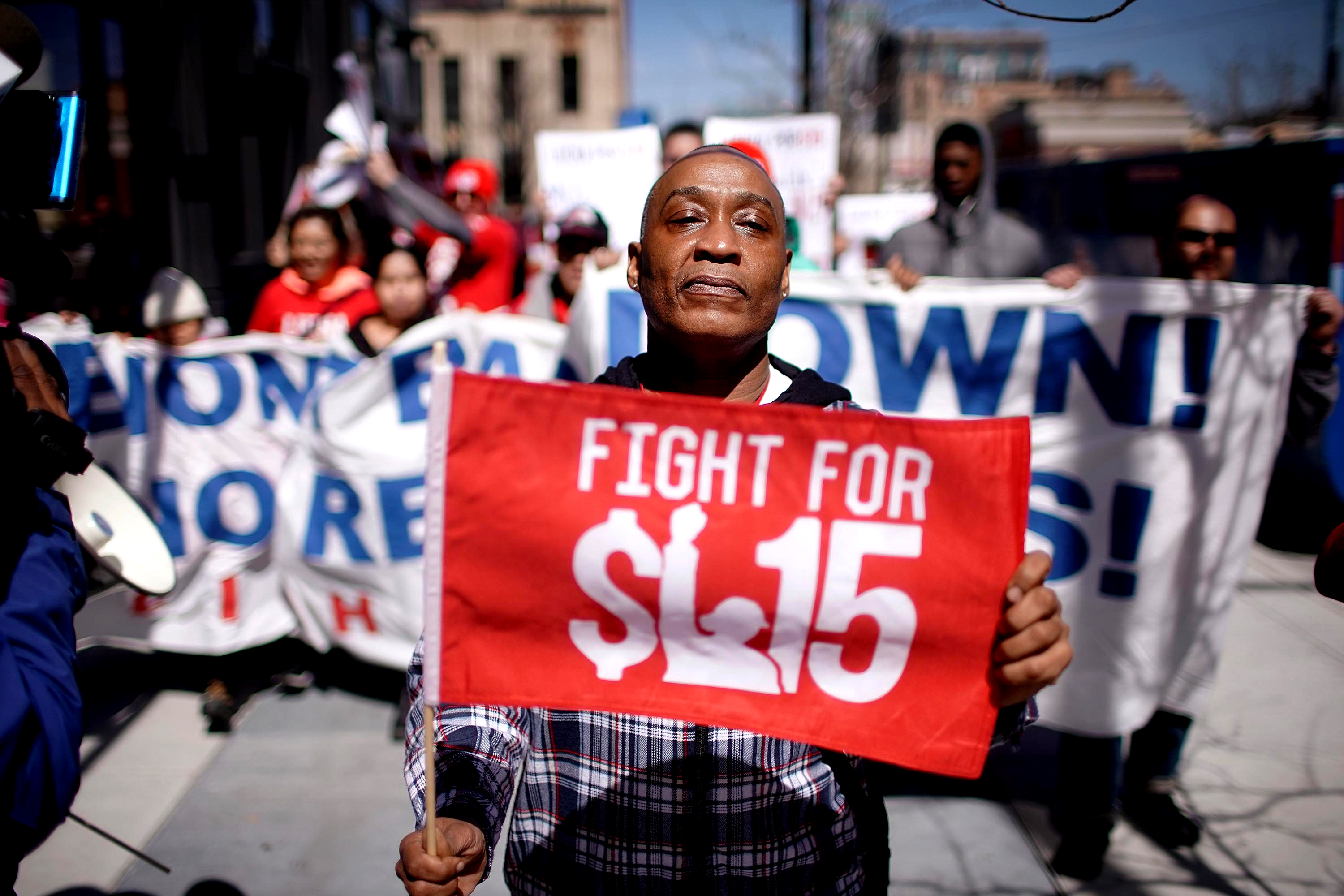The pros and cons of a $15 minimum wage
The movement to increase the federal minimum wage is gaining steam. What are the benefits and costs?

The smartest insight and analysis, from all perspectives, rounded up from around the web:
A Congressional Budget Office analysis released last week "makes clear that the benefits of a $15-an-hour minimum wage would heavily outweigh the downside," said Michael Hiltzik at the Los Angeles Times. The agency found that as many as 1.3 million people could be lifted out of poverty if the federal minimum wage rose from $7.25 in stages over five years, boosting the wages of 27 million Americans. The CBO said the change might also lead to the loss of 1.3 million jobs. Opponents have seized on that point, but the agency acknowledges it is "manifestly more uncertain than most of the rest" of the analysis. This uncertainty sounds familiar, said Noah Smith at Bloomberg. Many CBO studies rely on sifting through a large and often contradictory body of research. The most recent studies, however, tend "to find very small job losses from raising pay floors." In many places and industries, companies "hold wages below what a competitive market would offer." A higher minimum could just restore the competitive balance between workers and employers.
Tell that to the small businesses that are particularly vulnerable to cost increases, said Tiana Lowe in the Washington Examiner. Big businesses, meanwhile, will simply automate the jobs. "Just go to your local McDonald's and order from the kiosk to see this in action." Some companies in places that have raised the minimum wage are already blaming wage laws for driving them out of business, said Jeremy Hill at Bloomberg. Restaurants Unlimited, a West Coast chain of 35 fine-dining and casual eateries, filed for bankruptcy protection last week. It said "progressive wage laws" in Seattle, San Francisco, and Portland had inflated "wage expenses by a total of $10.6 million" — more than the midsize chain, with total revenue of $176 million in a year, could afford.
The Week
Escape your echo chamber. Get the facts behind the news, plus analysis from multiple perspectives.

Sign up for The Week's Free Newsletters
From our morning news briefing to a weekly Good News Newsletter, get the best of The Week delivered directly to your inbox.
From our morning news briefing to a weekly Good News Newsletter, get the best of The Week delivered directly to your inbox.
Don't base your opinion on one example, said economists Anna Godoey and Michael Reich at CNN. We've done the research on 51 minimum-wage increases in 45 states and found that "higher minimum wages do not have adverse effects on employment." We also found that in low-wage areas "where the highest proportion of workers received pay increases," there were wage increases across the board. That matches other research that "wage increases ripple upward," said Andrew Van Dam at The Washington Post. As much as "about 40 percent of wage benefits go to workers who aren't directly affected" by the law. And there are other surprising benefits: "Raising the minimum wage by 10 percent could reduce suicides by 3.6 percent among adults with a high school degree." Another bonus: Higher minimum wages have even been shown to cut crime, by making ex-convicts less likely to return to their old ways.
A free daily email with the biggest news stories of the day – and the best features from TheWeek.com
-
 Wellness retreats to reset your gut health
Wellness retreats to reset your gut healthThe Week Recommends These swanky spots claim to help reset your gut microbiome through specially tailored nutrition plans and treatments
-
 Climate change could lead to a reptile ‘sexpocalypse’
Climate change could lead to a reptile ‘sexpocalypse’Under the radar The gender gap has hit the animal kingdom
-
 7 hotels known for impeccable service
7 hotels known for impeccable serviceThe Week Recommends Your wish is their command
-
 The pros and cons of noncompete agreements
The pros and cons of noncompete agreementsThe Explainer The FTC wants to ban companies from binding their employees with noncompete agreements. Who would this benefit, and who would it hurt?
-
 What experts are saying about the economy's surprise contraction
What experts are saying about the economy's surprise contractionThe Explainer The sharpest opinions on the debate from around the web
-
 The death of cities was greatly exaggerated
The death of cities was greatly exaggeratedThe Explainer Why the pandemic predictions about urban flight were wrong
-
 The housing crisis is here
The housing crisis is hereThe Explainer As the pandemic takes its toll, renters face eviction even as buyers are bidding higher
-
 How to be an ally to marginalized coworkers
How to be an ally to marginalized coworkersThe Explainer Show up for your colleagues by showing that you see them and their struggles
-
 What the stock market knows
What the stock market knowsThe Explainer Publicly traded companies are going to wallop small businesses
-
 Can the government save small businesses?
Can the government save small businesses?The Explainer Many are fighting for a fair share of the coronavirus rescue package
-
 How the oil crash could turn into a much bigger economic shock
How the oil crash could turn into a much bigger economic shockThe Explainer This could be a huge problem for the entire economy